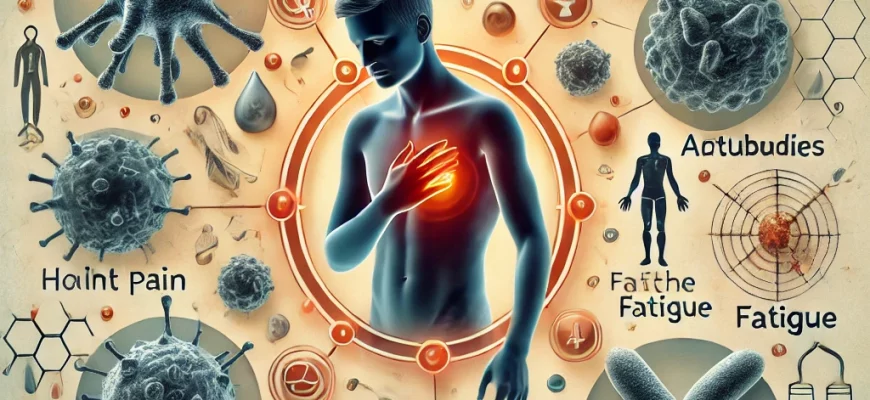Autoimmune diseases are conditions where the immune system, which is supposed to protect the body from harmful invaders like viruses and bacteria, mistakenly attacks healthy cells. This can cause ongoing inflammation, tissue damage, and a range of symptoms that can seriously affect daily life. To understand these diseases, it’s important to look at their symptoms, how they’re diagnosed, and the treatments available.
- What Are Autoimmune Diseases?
- Common Types of Autoimmune Diseases
- Symptoms of Autoimmune Diseases
- Causes and Risk Factors
- Diagnosing Autoimmune Diseases
- Treatment Options
- Medications
- Biologics
- Lifestyle Changes
- Alternative Therapies
- Surgery
- Living with Autoimmune Diseases
- Future of Autoimmune Disease Research
- Conclusion
What Are Autoimmune Diseases?
These diseases happen when the immune system can’t tell the difference between foreign invaders and the body’s own cells. This mistake leads the immune system to attack normal tissues, impacting various organs and systems. There are over 80 known autoimmune diseases, including common ones like rheumatoid arthritis and type 1 diabetes, as well as rarer conditions like systemic lupus erythematosus (SLE).
Common Types of Autoimmune Diseases
- Rheumatoid Arthritis (RA): Affects joints, causing pain, swelling, and stiffness.
- Type 1 Diabetes: Targets insulin-producing cells in the pancreas.
- Multiple Sclerosis (MS): Damages the protective covering of nerve fibers, affecting the central nervous system.
- Systemic Lupus Erythematosus (SLE): Can impact skin, joints, kidneys, and other organs.
- Celiac Disease: Affects the small intestine in response to gluten.
Symptoms of Autoimmune Diseases
Symptoms can vary widely depending on the specific disease and the organs affected. However, some common signs may suggest an autoimmune condition:
- Fatigue: Ongoing tiredness that doesn’t go away with rest.
- Joint Pain and Swelling: Common in RA and lupus.
- Skin Issues: Rashes, discoloration, or lesions, like the butterfly rash in lupus.
- Digestive Problems: Bloating, diarrhea, or abdominal pain, particularly in celiac disease.
- Fever: Low-grade fever is a common systemic symptom.
- Hair Loss: Often seen in conditions like alopecia areata or lupus.
- Numbness or Tingling: Found in neurological conditions like MS.
Because these symptoms can be similar to other medical issues, diagnosing autoimmune diseases early can be difficult.
Causes and Risk Factors
The exact causes of autoimmune diseases are not fully known, but they likely come from a mix of genetic and environmental factors:
- Genetics: A family history of autoimmune diseases can increase risk.
- Gender: Women are more likely than men to develop autoimmune diseases.
- Environment: Exposure to certain viruses, bacteria, or toxins might trigger an autoimmune response.
- Lifestyle: Factors like smoking, stress, and diet can also play a role.
Diagnosing Autoimmune Diseases
Diagnosing these diseases can be tricky because the symptoms are not always specific. Doctors usually follow several steps:
- Medical History: Asking detailed questions about symptoms, family history, and lifestyle.
- Physical Examination: Checking for signs like joint swelling, rashes, or neurological issues.
- Blood Tests:
- Antinuclear Antibody (ANA) Test: A common test for autoimmune activity.
- Erythrocyte Sedimentation Rate (ESR) and C-reactive Protein (CRP): Indicators of inflammation.
- Specific Antibodies: Tests for rheumatoid factor (RF), anti-cyclic citrullinated peptide (anti-CCP), or anti-double-stranded DNA (anti-dsDNA).
- Imaging: X-rays, MRIs, or CT scans to look at organ or joint damage.
- Biopsy: Taking tissue samples for conditions like lupus or celiac disease.
Treatment Options
While there’s no universal cure for autoimmune diseases, treatments aim to manage symptoms, reduce inflammation, and slow the disease’s progress. The treatment plan depends on the specific disease and its severity.
Medications
- Anti-inflammatory Drugs: Nonsteroidal anti-inflammatory drugs (NSAIDs) like ibuprofen for pain and inflammation.
- Corticosteroids: Medications like prednisone to suppress the immune response during flare-ups. Immunosuppressants
Medications such as methotrexate or azathioprine can help control the immune system’s activity.
Biologics
These drugs focus on specific parts of the immune system, like TNF inhibitors used in rheumatoid arthritis (RA).
Lifestyle Changes
Diet: Consuming an anti-inflammatory diet filled with whole foods, omega-3s, and antioxidants can be beneficial.
Exercise: Engaging in regular, moderate physical activity helps with mobility and reduces tiredness.
Stress Management: Methods such as yoga, meditation, and cognitive-behavioral therapy can be helpful.
Alternative Therapies
Acupuncture: This practice might help lessen pain and enhance overall well-being.
Herbal Supplements: Some individuals find relief with turmeric, omega-3s, or vitamin D, but these should be used under medical supervision.
Surgery
In severe cases, surgery might be necessary, such as joint replacement for advanced RA.
Living with Autoimmune Diseases
Managing these diseases often requires a team approach and a long-term commitment to treatment. Here are some tips for improving quality of life:
Regular Medical Checkups: Regular visits to the doctor help monitor the disease and adjust treatments as needed.
Support Groups: Joining a support group can provide emotional backing and practical tips.
Education: Learning about your condition can help you make informed choices.
Self-Care: It’s important to prioritize rest, stay hydrated, and eat balanced meals.
Future of Autoimmune Disease Research
Ongoing research is uncovering new insights into autoimmune diseases. Emerging treatments, including gene therapy and personalized medicine, show promise for better management. Researchers are also studying the gut microbiome’s role in autoimmunity, which might lead to new preventive measures.
Conclusion
Autoimmune diseases are complex and challenging, but with early diagnosis and proper treatment, many people can live fulfilling lives. Recognizing symptoms, seeking timely medical advice, and following a personalized treatment plan are key to managing these conditions effectively. As research advances, there is hope for improved therapies and, possibly, even cures for autoimmune diseases in the future.






